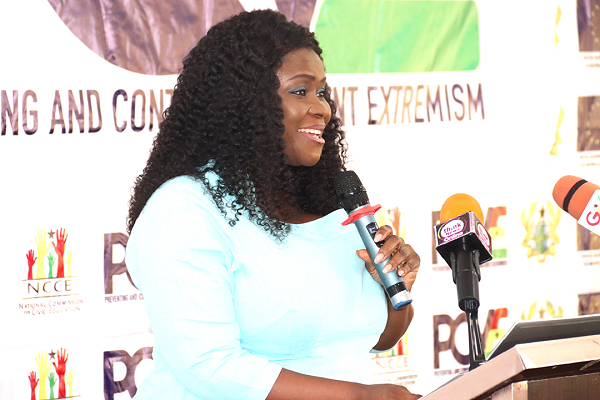Speakers at a programme on Preventing and Containing Violent Extremism (PCVE) in Accra have underscored the need for enhanced collaboration among state and non-state actors to prevent violent extremism in the country.
For them, collaboration among civil society organisations, the citizenry and the various security agencies was critical to dealing with violent extremism.
The speakers included the Principal Analyst at the Ministry of National Security, Dr Sayuti Baba; the Chairperson of the National Commission for Civil Education (NCCE), Kathleen Addy; the Director of National Centre for Coordination of Early Warning and Response Mechanism (NCCRM), Col. Joseph K. Merdiemah; Team Leader of COGINTA -Ghana, Rev. Fr Clement Aapengnuo and the Deputy Head of Programme on the Conflict Management Programme at the Faculty of Academic Affairs and Research at the Kofi Annan International Peacekeeping Training Centre, Afua Lamptey.
The rest are the General Secretary of the Christian Council of Ghana; Rev. Dr Cyril Fayose; Spokesperson of the National Chief Imam, Sheikh Aremeyaw Shaibu and Dr Afua Yakohene of the Legon Centre for International Affairs and Diplomacy.
Project
The PCVE project is an eighteen-month long intervention by the NCCE with support from the European Union’s Rapid Response pillar.
It seeks to help prevent and contain violent extremism and terrorism and promote social cohesion, peace and tolerance in the five northern regions - Upper West, Upper East, Savannah, North
East and Northern Regions and three other border regions; Oti, Bono East and Bono.
It will be implemented in 63 districts.
Setting the tone for the discussions, Ms Addy said, “a multidimensional approach to reducing threat of violent extremism gives us the best chance for success”.
“Indeed, the threat we face cannot be addressed in isolation as it forms part of a much bigger global network of dangerous non-state actors determined to destabilise vulnerable states and seize control of natural resources, as well as territories,” she said.
Dr Baba said the establishment of the National Counter Terrorism Centre was unique because in order to fight terrorism, there was the need for a way to coordinate all efforts of every agency and also strengthen cooperation to deal with terrorism.
He said there was the need to commend the NCCE for education and awareness creation and stressed the need that it be supported to do more.
Consistent
Col. Merdiemah said there was the need to create consistent template for early warning.
“So you can have the signs and warning but if you don’t have a template , nobody would hear what you are saying and nobody may even understand what is going on,” he said.
Rev. Dr Fayose said in order to prevent and contain violent extremism in Ghana, there was the need to establish dialogues.
He said dialogue was adopted in1989 to enhance peaceful coexistence and national operation in Ghana.
Mrs Lamptey said Ghana had learnt from the experience of the Grand Bassam attacks in Cote d’ Ivoire as the threat of violent extremism came closer.
She said it was, therefore, important that the country put in place some intervention to mitigate effects of such an act and terrorism.
Measures
Dr Yakohene of the Legon Centre for International Affairs and Diplomacy (LECIAD) said some measures put in place by the ECOWAS Community to curb terrorism and violent extremism included the Accra initiative.
She said the initiative was a cooperative and collaborative security mechanism among member states aimed at preventing the spread of terrorism from the Sahel to the coastal areas and address issues of transnational organised crimes.
Earlier, the Head of the European Union, Irchad Razaaly, said the EU had been a partner aimed at ensuring peaceful electoral process to reduce the risks of violence among the vulnerable communities across the country.

